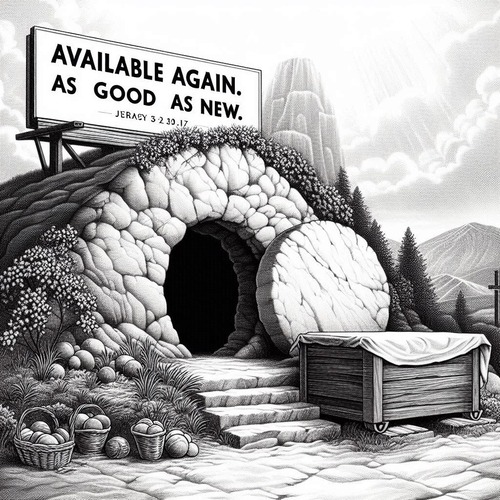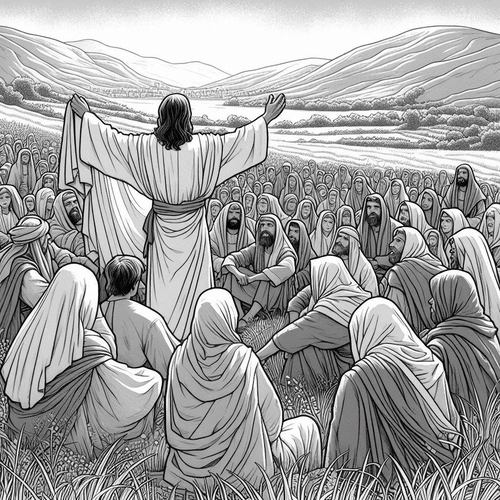By Divine Appointment: How the Wise Men Found Baby Jesus
Spare a thought for these determined men. They travelled hundreds of miles across harsh desert terrain, following nothing more than a celestial light and an ancient prophecy. The Magi’s journey to find the infant Jesus remains one of Scripture’s most captivating mysteries. How did these pagan scholars from the East know to look for a Jewish king? What drew them to make such a perilous journey? The Reformed tradition offers compelling answers to this biblical puzzle.
WHO WERE THESE “WISE MEN”?
The Magi were not kings, despite what Christmas carols might suggest. They were scholars, astronomers, and counsellors to Persian royalty. In their culture, they studied the stars for signs and omens—a practice actually forbidden in Jewish law. Yet God, in His sovereign wisdom, chose to reveal His Son to these Gentile seekers through means they would understand.
Calvin noted these men must have practiced “a degenerate form of astrology,” yet God condescended to meet them where they were. The Reformed tradition emphasises this as a powerful demonstration of God’s grace extending beyond Israel to the nations, even using elements of pagan practice to draw people in to divine truth.
THE BIBLICAL ACCOUNT
Matthew’s Gospel tells us simply: “Now after Jesus was born in Bethlehem of Judea in the days of Herod the king, behold, wise men from the east came to Jerusalem, saying, ‘Where is he who has been born king of the Jews? For we saw his star when it rose and have come to worship him’” (Matthew 2:1-2).
Notice what this reveals: they knew not just that a star had appeared, but what it signified—the birth of the “king of the Jews”—and they understood this king deserved their worship. Not just their respect or gifts, but their worship, too. This specific knowledge requires explanation.
BUT HOW DID THEY KNOW? THE REFORMED PERSPECTIVE
The Reformed tradition emphasises three interwoven threads of divine providence that led these men to Bethlehem:
The Babylonian Connection: Most Reformed scholars point to the Babylonian exile as key to understanding the Magi’s knowledge. When Judah was conquered by Babylon (later part of the Persian Empire), many Jews were forcibly relocated to the East, bringing their Scriptures and prophecies with them.
Daniel, a Jewish exile who rose to prominence in Babylon, likely had profound influence. Daniel 5:11 describes him as “chief of the magicians, enchanters, Chaldeans, and astrologers.” The book of Daniel contains specific Messianic prophecies and timeframes that would have been preserved among Eastern scholars for generations.
Jonathan Edwards wrote “the same Divine Spirit who inspired Daniel probably informed them that the time was fulfilled.” Reformed thought sees God’s sovereignty clearly displayed in positioning Daniel to plant seeds that would, centuries later, bear fruit in the Magi’s journey.
Scriptural Knowledge: The Magi almost certainly knew of Balaam’s prophecy in Numbers 24:17: “A star shall come out of Jacob, and a sceptre shall rise out of Israel.” This obscure prophecy, given by a non-Israelite prophet, specifically links a star with the coming Messiah.
When the Magi arrived in Jerusalem, they went directly to Herod asking about the “king of the Jews.” When Herod consulted the chief priests and scribes, they immediately cited Micah 5:2, identifying Bethlehem as the Messiah’s birthplace. The Magi’s knowledge combined with the Jewish scholars’ directions provided the full picture.
God’s special revelation (Scripture) illumined the meaning of general revelation (the star). As John Calvin put it, “God’s Word must direct us; and then, the works of God must be viewed in the light of his Word.”
The Providential Star: What about the star itself? Reformed commentators have typically taken a “both/and” approach, seeing both natural and supernatural elements in this celestial sign.
Some point to the conjunction of Jupiter and Saturn in 7-6 BC, which would have appeared as an extraordinarily bright star. Others suggest a supernova or comet. The Reformed tradition emphasises God’s providence may have worked through natural means—whatever astronomical event occurred, God sovereignly timed it to coincide with Christ’s birth and used it to guide these particular men.
As Charles Spurgeon said, “God, who ordains providence, overrules all things to the end of His design, making even the actions of those who know Him not to subserve His holy purposes.”
HOW THE WISE MEN FOUND BABY JESUS: THE THEOLOGICAL SIGNIFICANCE
For Reformed thinkers, the Magi’s journey demonstrates several key theological truths:
- God’s Election Knows No Boundaries: That God would choose pagan astrologers to be among the first to worship Christ emphasises His sovereign election extending beyond expected boundaries.
- The Unity of Redemptive History: God had been preparing for this moment since Daniel’s time and before, demonstrating His meticulous providence across centuries.
- First Fruits of the Gentiles: The Magi prefigure the ingathering of the nations, foreshadowing the Great Commission and the worldwide church.
- Divine Condescension: God meets people where they are, using elements of their culture and understanding to draw them to greater truth.
CONCLUSION: HOW THE WISE MEN FOUND BABY JESUS
The story of the Magi reminds us God is actively working to draw people to His Son from every nation, tribe, and tongue. He sovereignly uses various means—creation, culture, Scripture, and circumstance—to lead seekers to Christ.
The journey of these wise men reminds us God’s sovereign plan of salvation extends to all peoples, that He uses both natural and supernatural means to accomplish His purposes, and that those who earnestly seek Him will find Him—even if they begin their search from the most unexpected places.
As Matthew Henry wrote, “Those who truly desire to know Christ, and find him, will not regard what they are asked or what hazards they run in seeking him.”
God’s divine appointment with the Magi shows us that when heaven touches earth, no distance is too far, no journey too difficult, and no background too foreign for those whom God calls to worship His Son.
HOW THE WISE MEN FOUND BABY JESUS: RELATED FAQs
How many Magi actually visited Jesus? The Bible does not specify a number. It only mentions they brought three gifts. The tradition of three Magi (Caspar, Melchior, and Balthazar) developed later in church history. Reformed scholars typically emphasise that Scripture alone is authoritative, so they remain cautious about claiming a specific number where the Bible is silent.
- Why did the Magi bring gold, frankincense, and myrrh specifically? Reformed theologians often see profound symbolism in these gifts: gold acknowledging Jesus’ kingship, frankincense (used in temple worship) recognising His deity, and myrrh (used in burial) prophetically pointing to His sacrificial death. These providentially-chosen gifts not only had practical value for the holy family’s flight to Egypt but revealed the Magi’s divinely-given insight into Christ’s three-fold office as Prophet, Priest, and King.
- Why did God warn the Magi in a dream rather than through the star again? God has sovereign freedom to communicate through various means. While the star brought the Magi to Christ, the dream protected them from Herod, demonstrating how God’s providence operates differently in different circumstances while accomplishing His perfect will. This change in revelation method also shows God’s personal care and relationship with these Gentile seekers.
- Did the Magi actually find Jesus in a stable as commonly depicted? Matthew’s account indicates they found the “child with Mary his mother” in a “house,” not a stable, suggesting their arrival was likely weeks or even months after Jesus’ birth. Reformed interpreters typically emphasize careful exegesis over tradition, noting that the popular nativity scene compression of events sacrifices biblical accuracy for narrative simplicity.
- Why did God allow Herod to slaughter the children of Bethlehem? Reformed theology approaches this difficult question through the lens of God’s sovereignty over evil events. While Herod acted according to his wicked desires, God incorporated even this tragedy into His redemptive plan, fulfilling prophecy (Jeremiah 31:15) and paralleling Christ’s life with Israel’s history (the Exodus). The Westminster Confession affirms God “ordains whatsoever comes to pass” while never being the author of sin.
- Why did the Jewish religious leaders not accompany the Magi to find Jesus? Their indifference illustrates how spiritual blindness affects even those with the most scriptural knowledge. These leaders could cite Micah’s prophecy yet failed to act on it, demonstrating that head knowledge without heart transformation leads to spiritual complacency. This contrast between the seeking Gentiles and indifferent Jewish leaders foreshadows the gospel’s reception throughout Acts.
When did the star first appear, and when did it disappear? The text suggests the star appeared around the time of Jesus’ birth and guided the Magi specifically to Bethlehem after their Jerusalem visit. Reformed commentators often connect this timing to God’s perfect providence—the star appeared precisely when needed to fulfil God’s redemptive purposes and disappeared once it had accomplished its divine mission. This temporary celestial sign demonstrates God’s sovereign control over creation to accomplish His perfect plan of salvation.
HOW THE WISE MEN FOUND BABY JESUS: OUR RELATED POSTS
- The Bethlehem Connection: Why God Chose a Humble Town For His Son
- The King is Born: How Ancient Prophecies Foretold Jesus’ Arrival
Editor's Pick

‘Flee Sexual Sin’: Why Does Paul Single This Sin Out?
When the apostle Paul writes to the Corinthian church, he doesn’t tell them to simply avoid sexual immorality or resist [...]

Does Denying God’s Sovereignty Mean Denying the Gospel?
RC Sproul once warned denying God’s sovereignty “eviscerates” grace—a strong word meaning to gut or disembowel something, leaving only an [...]

Why Christians Fast: The Biblical Discipline’s Very Real Rewards
Why would Christians, who rejoice in the good gifts of food and fellowship, deliberately choose to go without? Isn’t fasting [...]

The Christian Sabbath: Why Did Sunday Replace Saturday?
Consider this: God-fearing Jews who’d faithfully observed Saturday Sabbath for over a thousand years suddenly began gathering for worship on [...]

Did the Early Christians Worship Jesus? The Biblical Evidence
It was a startling transformation: Jewish fishermen who'd spent three years following this itinerant carpenter from Nazareth now begin to [...]

If Jesus is Messiah, Why Aren’t ALL Messianic Prophecies Fulfilled?
If Jesus is truly the Messiah, why hasn't world peace arrived? Why do Jews still face persecution? Why isn't the [...]

When Courage Fails: Will I Be Forgiven If I Deny Christ in Persecution?
The rooster crowed, and Peter remembered. In that devastating moment, the apostle realised he’d just done the unthinkable—three times he’d [...]

What Makes a Godly Dad? 5 Biblical Principles Fathers Need
Modern culture sends fathers mixed messages. Be strong but sensitive. Be involved but not overbearing. Lead but don’t dominate. With [...]

What Makes a Godly Mom? A Scripture-Backed Guide
In our culture’s confusion about gender roles and parenting, the timeless question remains: what makes a godly mother? While secular [...]

Paul’s Mandate for Men: Headship Or Servant Leadership? Or Both?
Modern Christianity has fallen into a trap. We've created an either/or battle between "headship" and "servant leadership," as if these [...]
SUPPORT US:
Feel the Holy Spirit's gentle nudge to partner with us?
Donate Online:
Account Name: TRUTHS TO DIE FOR FOUNDATION
Account Number: 10243565459
Bank IFSC: IDFB0043391
Bank Name: IDFC FIRST BANK






